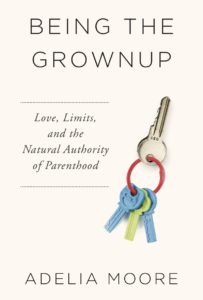You Were a Kid Once by Adelia Moore, author, Being the Grownup (Book Excerpt)
 You Were a Kid Once
You Were a Kid Once
My parents required clean rooms and made beds of me and of my siblings, without adult help. With my own kids, I cared enough about order to want the rooms eventually cleaned up, but not so much that I needed it done regularly or on their own. I didn’t have complete confidence in my kids’ ability to do it well themselves, partly because we hadn’t trained them early, a decision I suppose my husband and I made by default: Neither of us is great about putting clothes and books and shoes away ourselves! And why was I the one helping and not my husband? I wasn’t the only parent, after all. Like many women, I may have thought it was my bailiwick, but to be honest it wasn’t something my husband seemed to care about a whit: It was my value and my assertion of authority. My decision to help them clean their rooms reflected a value perhaps influenced by the culture of my generational cohort: By making it a project we did together, not only was I able to lend some organizing advice and modeling, we also got to spend time together.
As your child ages, the stakes get higher. Your phone rings at nine on a Saturday morning. “I have to tell you something,” says the mother of your son’s friend. “I’m very embarrassed. I should have told you sooner, but Joe and Trevor drank some whiskey when Joe slept over three weeks ago.” Joe is 14. You march into his room and wake him up to confront him. “Did you drink whiskey at Trevor’s?” He panics and sits bolt upright. “It’s true. I’m sorry! I’m sorry! I’m sorry! I just wanted to know what it was like. I’ll never do it again.” What do you do? And how do you decide what to do? You’ve got the upper hand not only because you’re the parent but because you’re awake and on your feet. But you’re upset too. Personal influences may come to mind first: Perhaps you had an alcoholic parent or uncle; perhaps you grew up in a very strict household and rebelled with alcohol or drugs yourself. How you react carries on or perhaps rebels against the values and beliefs and habits and practices you grew up with, your version shaped by the particulars of who you are. This is moral development in practice. It shows the power parents have, by virtue of being parents, to shape their children’s character, passing on both household rules and conventions of the wider society, including the idea of respect for authority itself. [1]
Biology in Decision-Making
But where does that power come from? How do you know — or at least decide — what’s okay for your child, whether about food, friends, or the Web? The most basic motivation for any animal is keeping one’s offspring safe and healthy. This motivation helps make man contemporary parents vulnerable to fears and anxieties of all kinds, from what their children eat to sexual predators. Joseph LeDoux, one of the leading researchers on the neuroscience of both fear and anxiety, distinguishes them this way: If there is a present threat to your child’s safety, you will experience fear. But if you anticipate the possibility of future danger, you will be anxious, a feeling exacerbated by all that you don’t know. And of course, people vary, including co-parents, whether together or apart. One parent might allow a brand-new driver to take his sister to get ice cream, while another might require a probationary period. And another might prohibit ice cream altogether! One source of such differences is parental temperament and your different thresholds of worry. It helps to recognize that your perception of safety, whatever its source, determines your actions, and work to resolve differences with a co-parent if necessary.
You have your own inner voice about your child’s welfare, whether about sheer survival or about health and psychological well-being. As the big animal in charge of small animals, it is normal to be at least somewhat protective, to want to keep your child out of harm’s way, or to keep her from experiencing anxiety. The parental brain is motivated by oxytocin and other hormones to nurture, protect and bond with offspring. [2] And a primary function of attachment is to keep track of the other’s whereabouts, which has the potential to increase your anxiety. The state of you own attachment helps you decide where a child can go and for how long, to a friend’s house, to summer camp, on an out-of-town school trip. Research suggests that fear related to separation is distinct from fear related to threat. Fear and anxiety can play a significant role in your authority, as your grapple with what limits are appropriate.
Of course, it is not only physical fear that can trigger difficult decision-making. For example, the amygdala, which is associated with fear and anxiety, is also associated with disgust, including disgust at the behavior of people who violate social norms. A simple version of what happens is that a sort of neurobiological dialogue takes place between your prefrontal cortex (your executive and evolutionarily most recent brain) and your amygdala, which needs calming down because it is trying out all the different possibilities and how you might feel should one of them take place.[3] If I call my neighbor and complain that her child is using bad language around mine, how is she likely to react? Will it mean an end to play dates? Will it mean I can’t borrow an egg if I need one? Do I care? How bad is it? These inner dialogues shape your authority.
[1] Damon, William. The Moral Child. New York: The Free Press, 1988.
[2] Porges, Stephen, and Sue Carter. “The Neurobiology and Evolution of Mammalian Social Behavior. Evolution, Early Experience and Human Development, edited by Darcia Narvaez, Jaak Panksepp, Allan Schore, and Tracy Gleason. Oxford: Oxford University Press, 2013, 132-151.
[3] Sapolsky, Robert M. Behave: The Biology of Humans at our Best and Worst. New York Penguin Press, 2017, 42-43, 56-58.
 ABOUT THE AUTHOR
ABOUT THE AUTHOR
Adelia Moore is a clinical psychologist in NYC specializing in therapy with couples, parents, families, and young adults. Moore received her BA in English from Harvard, a MS in Child Development from the University of Pittsburgh, and a Ph.D. in Clinical Psychology from the University of Cincinnati. Moore’s essays have appeared in the Christian Science Monitor and Huffington Post. She has four sons and five grandchildren, and lives in Manhattan and Upstate New York with her husband. Visit adeliamoore.com.
Tags: adelia moore, being a grownup, being a kid, childhood, having kids, motherhood, parenting, raising a family















